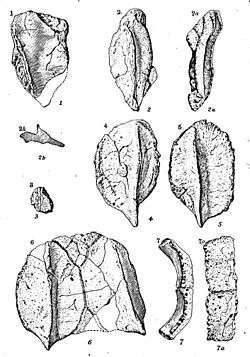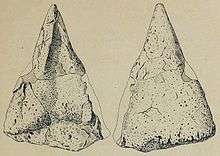Hierosaurus
| Hierosaurus Temporal range: 87–82 Ma | |
|---|---|
 | |
| Holotype | |
| Scientific classification | |
| Kingdom: | Animalia |
| Phylum: | Chordata |
| Class: | Reptilia |
| Clade: | Dinosauria |
| Order: | †Ornithischia |
| Suborder: | †Ankylosauria |
| Family: | †Nodosauridae |
| Genus: | †Hierosaurus Wieland, 1909 |
| Species: | †H. sternbergii |
| Binomial name | |
| Hierosaurus sternbergii Wieland, 1909 | |
Hierosaurus (meaning "sacred lizard") is an extinct genus of nodosaurid ankylosaur which lived during the Cretaceous 87 to 82 million years ago. Its fossils were found in the Smoky Hill Chalk Member of the Niobrara Formation, in western Kansas, which would have been near the middle of Western Interior Sea during the Late Cretaceous. It was a nodosaurid, an ankylosaur without a clubbed tail.

The only species of this genus, Hierosaurus sternbergii, was described by George Wieland on the basis of cranial and postcranial osteoderms collected by Charles Hazelius Sternberg in the Niobrara Formation of western Kansas.[1] Nowadays, Hierosaurus is considered a nomen dubium, and a second species, H. coleii, was re-assigned to the new genus Niobrarasaurus in 1995.[2][3]
See also
References
- ↑ G. R. Wieland. 1909. A new armored saurian from the Niobrara. The American Journal of Science, series 4 27:250-252
- ↑ K. Carpenter, D. W. Dilkes, and D. B. Weishampel. 1995. The dinosaurs of the Niobrara Chalk Formation (Upper Cretaceous, Kansas). Journal of Vertebrate Paleontology 15(2):275-297
- ↑ M. K. Vickaryous, T. Maryanska, and D. B. Weishampel. 2004. Ankylosauria. In D. B. Weishampel, P. Dodson, and H. Osmolska (eds.), The Dinosauria (second edition). University of California Press, Berkeley 363-392.

